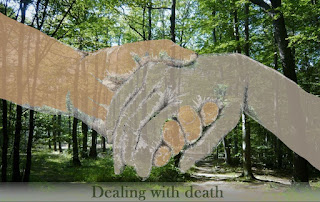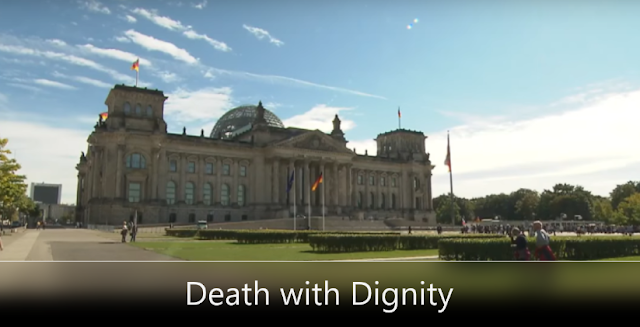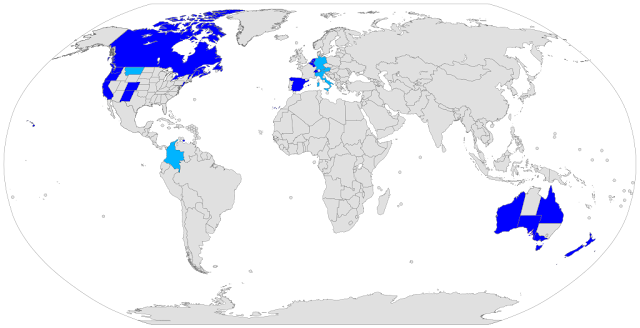Dealing with a topic like death and dying is not easy for most people. Especially when it comes to death and dying in their personal environment, many people don't know at all how to deal with it. But that was not always the case, because there were times when death was, so to speak, a constant companion of people.
Today we don't come into contact with death that much as our ancestors in the past.
There are several reasons one is, the general life expectancy of people is increasing due to improved living conditions and modern medicine.
The global life expectancy at birth for women is 75 years old and for men, it’s 70 years old. However, in America, the average life expectancy for women is 81 years and for men 77 years. On average, a woman lives 82 years and a man only 76 years in Germany.
In the erstwhile centenaries things were quite different. On average, the people in previous years of the turn-of-the-century 1891-1900 men only became 40 years old and women 44 years old in Europe. But even kings, rich people and the first industrialists - who lived better than the common people, seldom lived longer than 55 years on average. But I don't want to focus on numbers - I like to look at the emotional side and world.
If you think about it, it is quite clear that people in those days were confronted with death much more often and earlier than we are today. Because today it's not at all unusual to be an adult when you first come into contact with the death of a family member.
The death was a constant companion
It was quite normal for people to die young, the death of children was anything but unusual (
only 52.9% babies became 1 year old in 1891-1900 in Germany). It sounds awful to us, but people had a completely different way of dealing with death back then. Death was, so to speak, a constant companion and a natural part of life.
A sick person during these days often noticed early that they might die soon, because by signs of illness it was clear that there was no longer any cure. Finally, when someone was dying there were early certain ceremonies performed. Windows and doors were closed, candles were lit, and relatives and friends gathered around the dying person's bed. So they could think back on their life and perhaps , apologize for something or they feel bad about and finally can say good-bye or wish a good journey to the 'other side'.
As mentioned in these days there were a number of ceremonies - and in addition, the dying person prayed to God for forgiveness of his sins and a priest gave absolution. In these days it was very important not to die without absolution. For this reason, a sudden death without witnesses was a very bad and combined with fear and fright. Today we see it differently - for many people dying without suffering is a more pleasant thought.
The 'relationship' to death changed and is changing constantly
A death is not longer commonplace, but a stroke of fate. People developed and develop a stronger sense that their life is unique and valuable and not just a short stop on the way to the afterlife. Of course, this also changed their attitude towards death and the extent of their grief when a loved one dies.
As already mentioned, people today come into contact with death late and only very rarely. Dealing with death and the deceased person is hardly conceivable thought and experience today, one has simply forgotten how to do it. The way we deal with death in our society is a completely natural development nowadays sadly - meaning by loosing this 'natural relation to death - the grief increased and is increasing - as the feelings by not dealing with the situation or upcoming situation is pushed further and further away. Nowadays many people don't really know how to deal with sick or old people and therefore unconsciously keep their distance. They don't like going to the hospital or nursing home, even to visit someone.
And today it is becoming very rare for someone to remain in their familiar surroundings or even with their relatives until the end of their lives.
Most people today die in hospitals, nursing or retirement home often alone - separated from their families and friends.
In the end, the relatives often have the feeling that they have not done everything and, in addition to their grief, also blame themselves. As mentioned above - in the days when apologize for something or the dying person feel bad about something or the relatives feel sorry or bad about something which happens in the past - so that they can say something or talk about it a last time - finding freedom or clarification and finally can say good-bye or wish a good journey to the 'other side'.
The mourning itself has changed, because there are fewer rituals which the generation before us still had - people in mourning are nowadays more on their own than they were in the past and they used to be. The undertaker and the funeral parlor will help organize the funeral and everything that goes with it, but after the funeral many mourners fall into a hole. At the latest from that moment mourners need family, friends and guides ... a grief counselor.
Everything was better in the old days?
While writing this a while you read this article you might get the impression that everything was better in the past. But that would be a too simple thought - and would remain to be proved.
Because, it is great that people live long lives today, that people are in good health for a long time and that many of us have to deal with death late.
But it certainly doesn't hurt to remember from time to time that death is a very natural part of life and indeed concerns each of us.
And it is difficult when it comes to the death of a loved one, because the thought of it is just incredibly sad. And that's usually when the ground falls out from underneath your feet.
And it's understandable that you don't want to deal with it too much. But choking feelings and to repress one's feelings and such thoughts cannot be a solution.
It helps to talk about such things more often in everyday life and to deal with the topic a little more consciously - a little more openly - a little more often - and involve your loved ones.
Two last side notes ...
And second as mentioned before even this is not really part of my motivation to write this article the numbers of life expectancy of people today and in the past ....
In this context to articles which might be interesting:








If you like - Please send me your comment, or suggestion you may have.
ReplyDeleteI will not publish the comments. If you want a reply please don't forget to leave your contact information.
Sie / Ihr könnt gerne Kommentieren - Kommentare werden nicht veröffentlicht!
Aber wenn Du / Ihr eine Antwort erwartet bitte hinterlasst auch eine Email-Adresse - Danke